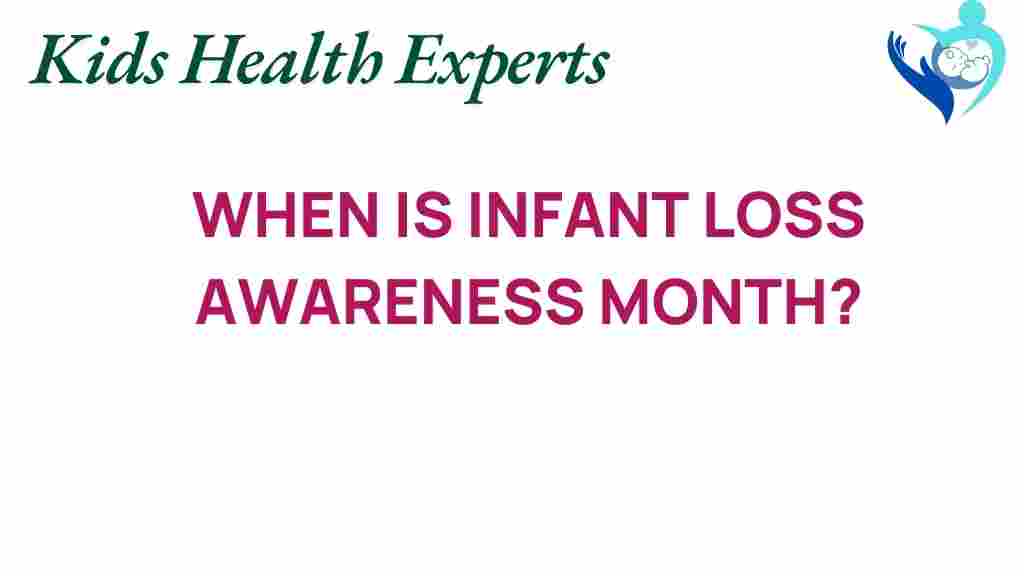Unveiling the Significance of Infant Loss Awareness Month
Every year, October is recognized as Infant Loss Awareness Month, a time dedicated to honoring the memory of babies who have passed away before, during, or shortly after birth. This month is not only a time of remembrance but also a crucial opportunity for awareness, education, and advocacy surrounding infant loss. Many parents and families experience profound grief during this time, and it is essential to provide them with the necessary grief support and community resources to navigate their loss.
The Importance of Awareness Month
Infant Loss Awareness Month serves several vital purposes:
- Raising Awareness: Many people are unaware of the realities and statistics surrounding infant loss. This month helps to shed light on the issue.
- Providing Support: It offers a platform for families to find grief support and connect with others who understand their pain.
- Encouraging Remembrance: It creates a dedicated time for parents and families to honor their lost children through various activities and memorials.
- Advocacy for Change: Awareness Month encourages advocacy for better healthcare practices and research into infant loss.
Understanding Infant Loss
Infant loss can occur at various stages, including:
- Miscarriage (before 20 weeks of gestation)
- Stillbirth (after 20 weeks of gestation)
- Neonatal death (within the first 28 days after birth)
Each type of loss brings its own challenges and emotional pain. Understanding these different experiences is crucial for offering appropriate grief support to affected families.
Steps to Support Families During Infant Loss Awareness Month
Supporting families during this sensitive time involves several steps that can help foster healing and community.
1. Acknowledge Their Loss
One of the most important things you can do for someone who has experienced infant loss is to acknowledge their grief. Here are some ways to do this:
- Offer your condolences and let them know you are thinking of them.
- Share their child’s name if they feel comfortable doing so.
- Listen openly and without judgment when they share their feelings.
2. Create a Remembrance Space
Encouraging families to create a remembrance space can help in the healing process. This could be:
- A small altar at home with photos and mementos.
- A designated garden or tree planted in memory of their child.
- Participating in community events that honor lost infants.
3. Provide Grief Support Resources
Offering information about available grief support resources is essential. Consider:
- Local support groups for parents and families.
- Online forums and communities where families can connect.
- Books and literature on coping with infant loss.
For more resources, you can visit March of Dimes, which offers information and support for families dealing with loss.
4. Encourage Open Discussions About Grief
Many people are unsure how to approach conversations about infant loss. Encouraging open dialogue can help normalize the experience:
- Share stories of loss and healing.
- Discuss the emotional toll and mental health implications of grief.
- Encourage families to express their feelings through art, writing, or other forms of creativity.
5. Advocate for Change
Advocacy is a powerful tool in raising awareness about infant loss. Families can:
- Engage with local and national organizations focused on infant health and loss.
- Participate in campaigns that promote better healthcare practices.
- Share their stories publicly to help educate others.
Troubleshooting Tips for Coping with Grief
Grieving the loss of an infant can be overwhelming. Here are some troubleshooting tips to help families cope:
- Seek Professional Help: If grief feels unmanageable, consider reaching out to a therapist specializing in bereavement.
- Join a Support Group: Connecting with others who have experienced similar loss can provide comfort and understanding.
- Practice Self-Care: Encourage families to prioritize their mental health through activities that bring joy and relaxation.
- Be Patient: Remind families that grief is a personal journey, and healing takes time.
Conclusion
Infant Loss Awareness Month is a crucial time to reflect on the significant impact of infant loss on families and communities. By raising awareness, offering grief support, and fostering remembrance, we can help those affected by this profound loss find healing and connection. Remember, whether through community involvement, personal advocacy, or simply being there for a friend, every effort counts in supporting those navigating their grief.
Let us work together as a community to ensure that no family feels alone in their journey of loss. By embracing open conversations, providing resources, and showing compassion, we can significantly impact the mental health and healing processes of those who have experienced infant loss.
This article is in the category Mental and created by KidsHealthExperts Team
